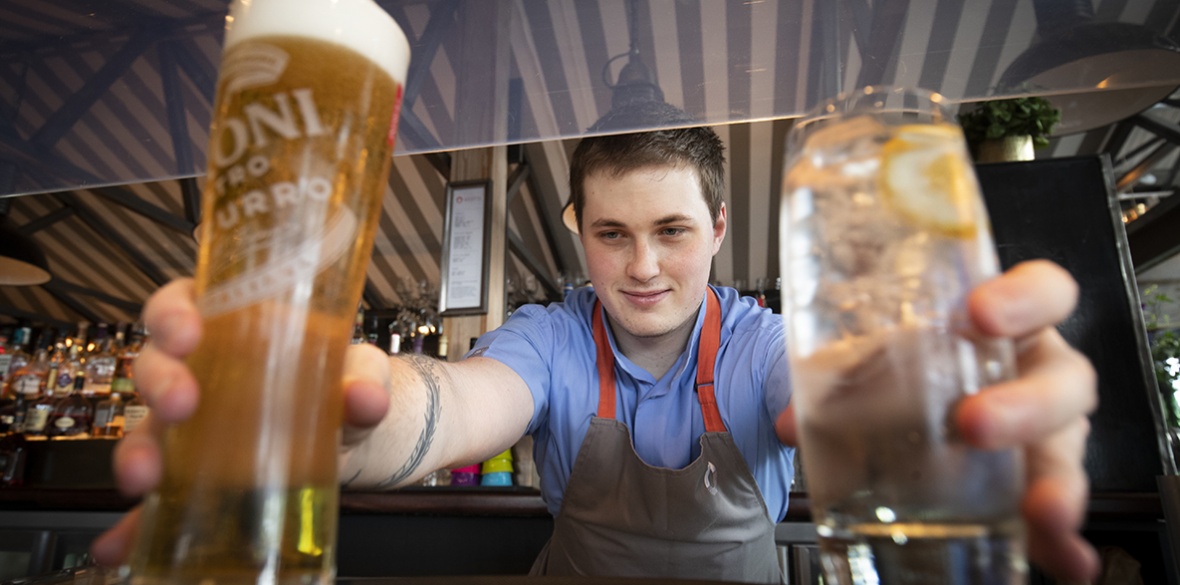This is the last article you can read this month
You can read more article this month
You can read more articles this month
Sorry your limit is up for this month
Reset on:
Please help support the Morning Star by subscribing here
THESE are difficult and challenging times for everyone on a personal and workplace level.
The psychological toll on individuals and families will be one of the most significant societal issues to emerge from the Covid-19 pandemic.
It is recognised by mental health experts that unemployment may increase the risk of suicide through an increased risk of depression, financial strain and reduced affordability of mental healthcare.
Millions of us have been confined to stay in our homes since March 16 when Prime Minister Boris Johnson encouraged the nation to stop going to pubs, restaurants and cafes.
These measures have been continued and strengthen in different parts of Scotland to the present day in the interests of public health.
In the two weeks which followed the Prime Minister’s announcement, more than 30,000 bartenders, baristas and housekeepers lost their jobs.
Unite welcomed the extension of the Westminster government’s Job Retention Scheme for another five months until the spring of 2021 but the indecision and hesitation has already cost tens of thousands of jobs across the economy, with the hospitality sector being at the sharp end.
Today there are around 146,000 workers in Scotland in the accommodation and food services sector, alongside 44,500 jobs in the arts, entertainment and recreation furloughed.
This is a staggering number but the scheme still hasn’t saved thousands of jobs in the Scottish hospitality sector and Unite has been fighting hard to secure justice for workers fired by their employers.
Marriott refused to furlough its 1,500 casual staff; a workforce of majority young women and migrant workers clubbed together and demanded fair and equitable treatment with their permanent counterparts and they won — reinstatement and 80 per cent wages backdated till March.
When Scotland’s largest hospitality employer, the G1 Group, sacked almost 2,000 workers by phone, Unite members immediately got to work organising their colleagues, launching a national social and mainstream media strategy aimed at the already battered reputation of the infamous employer.
Within 48 hours the company was forced into an embarrassing U-turn.
When the Scottish Events Campus sacked 630 of its hospitality staff by Facebook post, the mostly casual workforce decided enough was enough and wrote a collective letter to the venue director and local politicians.
The company agreed not only to bring the staff back but to pay those furloughed 100 per cent for the first two weeks.
When the huge venue was turned into the Louisa Jordan super-hospital in Glasgow, those staff who weren’t furloughed received between £9.30 and £12.30 per hour regardless of age.
A landmark “traffic-light” system was also implemented which ensures the health and safety of those members who kept the NHS workers of Glasgow fed and watered.
A list of other multinational companies have also put their workforce on standby for the chopping block.
Intercontinental Hotels Group, an organisation which made £3 billion last year alone, issued redundancy notices to thousands of staff.
At its flagship hotels in Glasgow and Edinburgh it has terminated 95 per cent of the workforce — almost 500 workers.
Less than two months after our members at IHG Flagships — Grand Central and The George Hotel — were terminated on the basis that their workplaces would be closed till at least March 2021, the hotels are set to open with new staff.
These companies have claimed that they have no other option and that customer levels are too low to sustain wages.
The problem with that argument is that for the last four months they’ve not been paying wages and now we wait to see if these companies will now use the extension in the job retention scheme or press ahead with their slash-and-burn, fire-and-rehire agenda.
Like British Airways, these multinational hospitality employers are using Covid-19 as an excuse to offload staff and slash terms and conditions — in some cases even bringing the same workers back on minimum wage, discriminatory youth rates and zero-hours contracts.
At its flagship hotels in Edinburgh and Glasgow airport, Holiday Inn has issued redundancy notices to everyone but the four most senior managers and is looking to bring the others back as “hospitality service experts” on as little as £9 an hour.
Covid-19 has provided a perfect cover for what many of these companies have been trying to do for years — to make their workforce as disposable and flexible as possible.
And this brings us to the next stage in our fight for hospitality workers, which is to ensure that all workers receive the guaranteed minimum wage levels so that there is a floor which no worker falls below.
We know that the minimum rate of hourly pay is exactly that. A rate which is calculated as a minimum that it is illegal for workers to fall below.
Unite is calling on the government to do two things — first, set a Job Retention Scheme earnings floor, which safeguards the minimum wage in any scheme that is provided.
Second, that wages paid to workers are based on their average hours worked.
We must throw our full weight and organising might behind winning a new deal for hospitality workers — no more poverty pay; no more zero-hours, no more mass redundancy on statutory packages — and guaranteeing the legal minimum hourly wage for all workers.
Pat Rafferty is Unite Scottish secretary.












